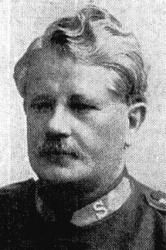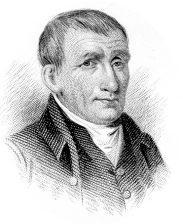Planning worship?
Check out our sister site, ZeteoSearch.org,
for 20+ additional resources related to your search.
- |
User Links
Person Results
‹ Return to hymnal


Export as CSV
Charles Coller

1863 - 1935 Hymnal Number: d109 Author of "Jesus is mighty to save" in Songs for Men, the Salvation Army Official Song Book Born: March 5, 1863, Romford, Essex, England.
Died: March 21, 1935, Edmonton, Middlesex, England.
Coller grew up in Woodford, and joined the Salvation Army (SA) at Regent Hall in 1885. He was a member of the SA Household Troops Band on its first campaign in 1887, and later played the trombone in the SA International Staff Band. Beginning in 1895, he worked in various SA trade depots, then in the Trade Department (later Salvationist Publishing and Supplies Ltd) in London. His last appointment was in charge of the music publications department, and he retired as an SA major in 1928. In 1880 he won a copy of Heber’s Poems as a prize for a temperance acrostic, and, from 1895, he contributed more than 200 songs to The Musical Salvationist.
--www.hymntime.com/tch/
Charles Coller
Ruth G. Hallett
Hymnal Number: d192 Author of "Thank you, Jesus, for all you've done" in Songs for Men, the Salvation Army Official Song Book Ruth was the wife of John Hallet, the co-writer of "Thank You, Jesus."
Dianne Shapiro
Ruth G. Hallett
John Lyth
1821 - 1886 Hymnal Number: d200 Author of "There is a better world, they say" in Songs for Men, the Salvation Army Official Song Book Lyth, John, D.D., was born at York, March 13, 1821. In 1843 he entered the Wesleyan ministry, and was sent in 1859 to Winnenden, as the first Wesleyan minister to Germany. On his return from Germany in 1865, he entered upon regular circuit work in Great Britain, and laboured at Sheffield, Hull, and other large towns until 1883, when he retired from the active work of the ministry. He died on March 13, 1886. His principal prose work was a History of Methodism in York. In 1843 he edited and published a small volume, entitled Wild Flowers; or, a Selection of Original Poetry, edited by J. L. This little work was made up of pieces by himself and members of his family, and the late Dr. Punshon. His hymn, "There is a better world, they say" (Heaven), appeared in the Methodist Scholars' Hymn Book, 1870; and his "We won't give up the Sabbath" (Sunday), in the Methodist Sunday School Hymn Book, 1879. Each of these is an imitation of an older hymn. Dr. Lyth informed the Rev. W. F. Stevenson, editor of Hymns for Church and Home, 1873, that the hymn "There is a better world, they say," was written at Stroud, in Gloucestershire (30th April, 1845) for the anniversary of the neighbouring infant-school at Randwich, and to an air then very popular, called 'All is Well.' That it was written for infant children will explain the simplicity of some of the expressions. It was speedily caught up, and I believe first appeared in the Home and School Hymn Book.
--John Julian, Dictionary of Hymnology (1907)
John Lyth
Mildred Duff
1860 - 1932 Hymnal Number: d234 Author of "Keep on believing, Jesus is near" in Songs for Men, the Salvation Army Official Song Book
Mildred Duff
Hugh Bourne

1772 - 1852 Hymnal Number: d128 Author of "My soul is now united to Christ, To Christ the" in Songs for Men, the Salvation Army Official Song Book Bourne, Hugh, the principal founder of the Primitive Methodist Society, and the editor of their first hymn-books, was born at Fordhays, Stoke-on-Trent, April 3, 1772. His father, Joseph Bourne, a person in humble circumstances, was a member of the Church of England, whilst his mother belonged to the Wesleyan Society. His education, for his circumstances, was fairly good; and by earnest application to study he acquired some knowledge of Hebrew, Greek, and Latin. His mind was of a strongly devotional cast, and the Methodist movement of those days had such attractions for him that he joined himself thereto in 1709. The following year he went to reside near the Mow Cop Colliery, near Burslem, where he had secured an engagement. There, with two or three men of kindred spirit, he carried on a system of Prayer Meetings which culminated in a great Camp Meeting, after the American fashion, upon the Mow Cop Mountain, on Sunday, May 31st, 1807. Other camp meetings followed, but were condemned by the Wesleyan Conference later in the same year. Hugh Bourne, however, continued his evangelistic work in connection with the Wesleyan Society until June 27, 1808, when he was excommunicated, without notice or trial, by the Quarterly Meeting held at Burslem on that day. Subsequent acts of coolness and indifference on the part of the Wesleyan authorities, together with continued success in his evangelistic work, led him gradually to organize the Primitive Methodist Connexion. The decisive break occurred in 1810. From that date to his death, on the 11th Oct., 1852, Bourne gave himself to the work of extending and building up the Society of which he was practically the founder. He was the first editor of its magazine, and the first to compile a hymnal for its use.
Hugh Bourne's first effort in hymnology was the published of a very small General Collection of Hymns and Spiritual Songs for Camp Meetings, Revivals, &c. 1809. This was enlarged and improved in 1819, 1820, 1821,1822, and again in 1824. To these editions he contributed 10 hymns. In 1829 a second collection was added by him to the foregoing, to which he contributed another 20 hymns. This is the Large Hymn Book, for the Use of the Primitive Methodists. From the first collection one hymn only is still retained in common use:—"Camp-meetings with success are crown'd,” altered to “Camp-meetings God has richly own'd," also rewritten by J. Flesher as, "This meeting with Thy presence crown," in the authorised hymnal of the Connexion; and from the second collection two hymns as follows:—
1. O Righteous Father, Lord of all. Prayer for Children.
2. We have a great High Priest. H. P. of Christ.
To the Large Hymn Book 146 hymns were also contributed which bore the signatures sometimes of "H. B. & W. S." and again "W. S. & H. B." In a note we are informed that the hymns with these ascriptions were by "Hugh Bourne and Wm. Sanders, jointly." Of these the following are at present in the authorized Primitive Methodist Hymn Book, 1853, and, in common with most of the hymns in that book, are greatly mutilated, and attributed now to Wm. Sanders and again to H. Bourne, without any apparent reason:—
1. A Pharisee unwisely stood. Lent.
2. Almighty God, of love divine. Praise.
3. Assist us, O Almighty Lord. Missions.
4. Come, let us lift our heart and voice. Christmas.
5. Come, with your sore diseases. Invitation.
6. Encouraged by Thy gracious word. Prayer.
7. Great Jehovah, Sovereign Lord. Prayer.
8. Hark, the Gospel news is sounding. Invitation.
9. Jesus, my Lord, was crucified. Passiontide.
10. Jesus, Who spilt His precious blood. The Advocate.
11. Led by the God of truth and grace. Seeking Heaven.
12. Light of the Gentile race. Missions.
13. My brethren in the Lord. Altered to— Ye foll'wers of the Lord. Faithfulness.
14. My soul is now united, &c. Altered to— By faith I am united. Union with Christ.
15. Now, Lord, I on Thy truth depend. Altered to— O Lord, I on Thy truth depend. Divine Aid.
16. Now, Lord, Thy blessing we implore. D. Blessing.
17. O, heavenly Zion, rise and shine. Altered to— Arise, O Zion, rise, &c. Missions.
18. See, in the mountain of the Lord. Missions.
19. Tho' in a world of sickness. Altered to— While in this world of sickness. Confidence.
20. To Thee, great Source of light. Confidence.
21. To Thee, O God of power divine. Goodness of God.
22. We now are journeying [going] to the place. Heavenward.
23. We read in Thy most holy word. Holy Baptism.
24. Ye sleeping souls, arise. Exhortation.
In addition to these, all of which are given in the official Collection of the Primitive Methodist Society, there is also:—
25. Welcome, 0 Saviour, to my heart. Prayer— which is well known to the American hymnals.
From a literary point of view these hymns are not worthy of the position which has been accorded to them for so many years. Their simplicity is their redeeming feature.
-- John Julian, Dictionary of Hymnology (1907)
===================
Bourne, Hugh, p. 165. ii., Nos. 14, "My soul is now united," and 19, "Tho' in a world of sickness," appeared in theSmall Hymn Book, 1821. Another hymn by Bourne and Sanders in the Primitive Methodist Hymnal, 1887, "Behold a sinner at Thy feet" (Penitence), is compiled from hymns 493 and 118 in the P. M. Large Hymn Book, 1824.
--John Julian, Dictionary of Hymnology, Appendix, Part II (1907)
Hugh Bourne
George H. Carr
Hymnal Number: d211 Author of "Jesus is real to me" in Songs for Men, the Salvation Army Official Song Book 20th Century
George H. Carr
O. S. Grinnell
1826 - 1926 Person Name: Orlando S. Grinnell Hymnal Number: d159 Author of "Glory, glory, Jesus saves me" in Songs for Men, the Salvation Army Official Song Book Orlando S. Grinnell was better known as a preacher than a songwriter. Still, the Wayne pastor's single hymn was a hit, not for its timeless melody but for its title. In 1921, the minister wrote a hymn for his flock to commemorate the 50th anniversary of the Wayne Congregational Church. Grinnell titled it "The Little Home Church by the Wayside."
http://articles.chicagotribune.com/199
O. S. Grinnell
George Jackson
1866 - 1893 Hymnal Number: d76 Author of "I want, dear Lord, a heart that's pure" in Songs for Men, the Salvation Army Official Song Book
George Jackson
Thomas Dennis
Hymnal Number: d54 Author of "He died of a broken heart for thee" in Songs for Men, the Salvation Army Official Song Book Dennis was an assistant pastor in Haslemere, Surrey, England. He edited a new edition of the Psalms in poems in 1908, which was printed by J. White, Horace Head, Fleet Street.
--www.hymntime.com/tch/
Thomas Dennis
Arch R. Wiggins
1893 - 1976 Hymnal Number: d153 Author of "Open wide the stable door" in Songs for Men, the Salvation Army Official Song Book
Arch R. Wiggins


 My Starred Hymns
My Starred Hymns


